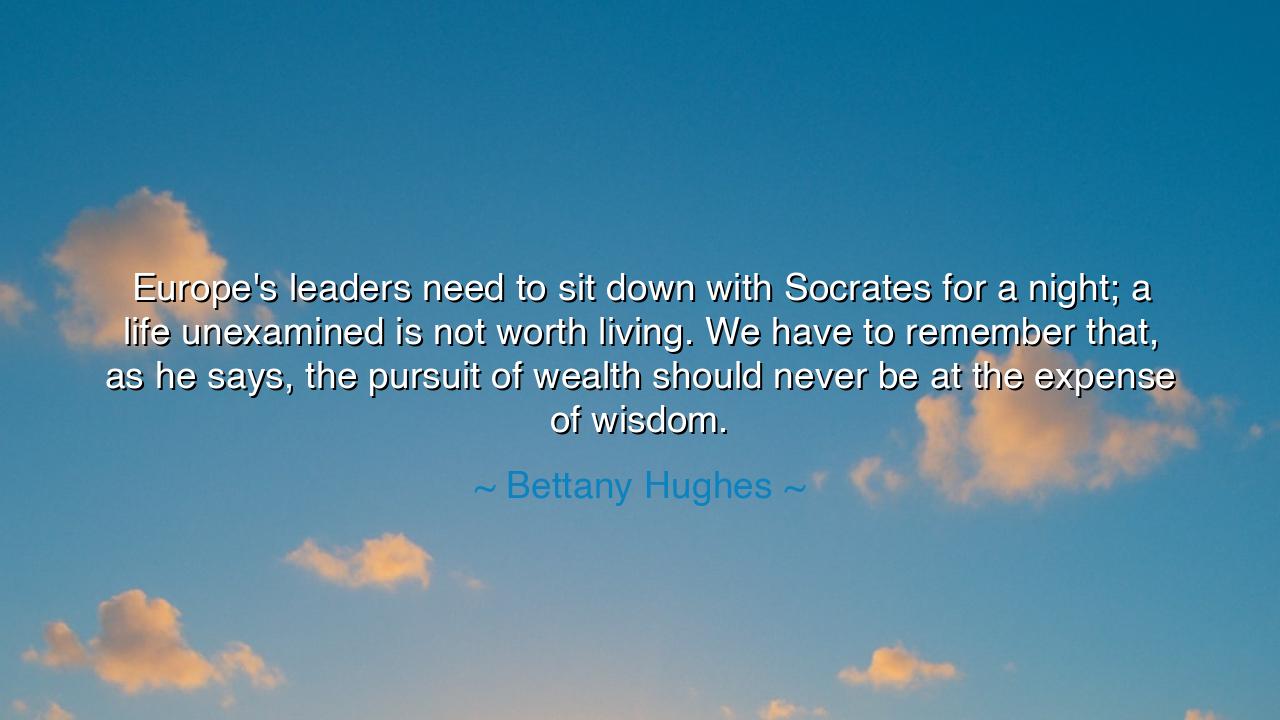
Europe's leaders need to sit down with Socrates for a night; a
Europe's leaders need to sit down with Socrates for a night; a life unexamined is not worth living. We have to remember that, as he says, the pursuit of wealth should never be at the expense of wisdom.






Hearken, O children of reflection, to the words of Bettany Hughes, who invokes the ancient wisdom of Socrates to counsel the leaders of Europe. She declares that a life unexamined is hollow, and that those entrusted with power must sit in contemplation, as if beside the Athenian sage himself, to weigh their deeds, ambitions, and the consequences of their choices. Herein lies a teaching for all generations: authority without reflection breeds folly, while wisdom tempered by scrutiny nurtures just and enduring governance.
The origin of this reflection springs from Hughes’ life as a historian and storyteller, a chronicler of the human journey who draws lessons from the triumphs and errors of civilizations. She recalls the enduring counsel of Socrates, whose dialogues with the citizens of Athens emphasized the moral and intellectual examination of life. Hughes urges modern leaders to heed this ancient principle, understanding that the pursuit of wealth or power, unmoored from ethical contemplation, can undermine the very societies they are sworn to serve.
The meaning of her aphorism is profound: the accumulation of riches or status is but a hollow prize if it comes at the expense of wisdom. Socrates taught that the value of life lies not in material gain, but in reflection, moral insight, and the cultivation of virtue. Leaders, therefore, must temper ambition with thoughtfulness, and decisions with the counsel of conscience, lest fleeting desire for power eclipse enduring principles of justice and truth.
History bears testament to Hughes’ counsel. Consider the reign of Nero in ancient Rome, who pursued indulgence, wealth, and personal ambition while neglecting the duties of governance. His unchecked pursuits led to chaos, suffering, and ultimately the decline of trust in the empire. In contrast, Marcus Aurelius, philosopher-king, exemplified Socratic reflection in leadership, balancing the pursuit of duty with the cultivation of wisdom, leaving a legacy of justice, humility, and enduring respect.
Moreover, this teaching extends beyond kings and presidents to all who wield influence. Every human endeavor carries the temptation to prioritize gain over insight, expedience over understanding. Hughes’ invocation of Socrates reminds us that a life examined, whether in the halls of power or in private reflection, nurtures discernment, moral courage, and the capacity to act with integrity, even amidst complexity and temptation.
O generations yet to come, heed this counsel: let not the pursuit of wealth or fleeting prestige overshadow the eternal quest for wisdom. Examine your life, question your motives, and weigh your choices, for it is in the marriage of power and reflection that leadership achieves its noblest purpose. Thus may the light of Socratic thought guide your deeds, and the measure of your life be not in riches, but in justice, understanding, and the courage to live wisely.






HBLe hoang bao
I feel this quote emphasizes the moral responsibility of leadership. How often do political decisions favor immediate financial or economic benefits over the broader pursuit of knowledge, justice, or societal well-being? Could embedding philosophical consultation or reflection sessions within governance structures improve policy outcomes? I also wonder if this principle is relevant not only for Europe but globally, particularly in an era dominated by capitalism, media pressure, and populism. It challenges us to consider what measures of success truly matter in leadership.
NNTD
This statement raises important questions about values and priorities in governance. Could the ‘life unexamined’ warning be applied to policy decisions that are reactive rather than reflective? I’m curious about practical ways leaders could incorporate ethical reflection without slowing down essential decision-making. Does encouraging wisdom over mere wealth require structural changes in how governments operate, or is it more about cultivating personal virtue and judgment? This also makes me think about the tension between short-term gains and long-term ethical considerations.
PLPhuong Lanvender
I find this perspective intriguing because it challenges the conventional metrics of success. Is the pursuit of wealth often prioritized at the expense of wisdom, insight, or moral judgment? Could integrating philosophical inquiry into leadership create more balanced and thoughtful governance? I’m also curious about the role of historical and cultural context—do contemporary leaders even have the time or inclination to sit with Socratic principles? This makes me wonder whether philosophy can realistically guide the fast-paced, pragmatic world of international politics.
GTPhi Hanh Gia Tran
Reading this, I feel both admiration and skepticism. How can leaders balance the urgent demands of politics with the slower, introspective process that philosophy encourages? Could regular engagement with ethical and philosophical perspectives prevent shortsighted decision-making? I’m curious whether Bettany Hughes is advocating for structured educational programs for leaders, or simply suggesting that personal reflection and moral reasoning should play a larger role in public life. How might this influence policies affecting social justice, the environment, or economic inequality?
DVdung vo
This quote makes me reflect on the tension between material gain and thoughtful leadership. Are European leaders—or leaders in general—too focused on economic growth at the expense of ethical reflection and wisdom? I wonder how practical it is to integrate philosophical thinking like Socrates’ into modern politics. Could encouraging a culture of reflection among policymakers lead to more sustainable and humane decisions? It also raises the question of whether wisdom can truly be quantified or prioritized alongside tangible metrics like GDP or trade balances.